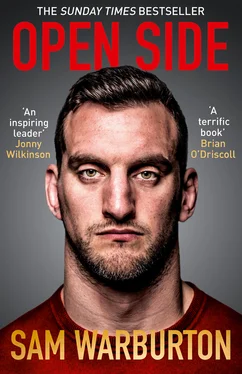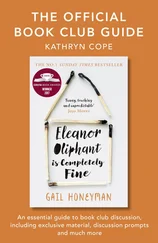‘What do you want to achieve?’ he asks. I’ve heard him ask this of some of the other boys at the academy too, and they all answer the same way. I want to turn professional. I want to play regional. I want to play for Wales.
‘I want to be the best 7 in the world,’ I say.
He doesn’t laugh or make a face. Just says he can help me do exactly that.
I sign with him. It’s one of the best moves I’ll ever make.
First day training with the senior Blues squad. I grew up with a Blues season ticket: watch them at the Arms Park on Friday night, play for Whitchurch on Saturday morning. All that time, I’d dreamed about making the jump from one to the other. And now I’ve done it.
You’re good enough to be here , I tell myself. They wouldn’t have signed you if they didn’t think you were up to it.
‘Hello, Sam.’
It’s Martyn Williams: club captain, Wales legend, and my rugby hero. Also current holder of the Blues and Wales number 7 shirt. He was one of the main reasons why I wanted to play rugby. I remember watching the 2005 Six Nations and not a game would go by where he wouldn’t get man of the match or score a try. He was absolutely amazing.
He shakes my hand – the very first person to do so at the club – and takes me under his wing.
This is one of the bittersweet things about rugby, that you can end up competing for the same position as someone you idolised as a schoolboy, and maybe even usurping them. Right now, that’s a way off, but it won’t be for long.
And maybe Martyn sees it before I do. Later, he’ll tell me: ‘I knew you were going to take my spot as soon as you walked in. I saw you training and I knew, Christ, I haven’t got long left here.’
September. I’m feeling good. I might have missed the Under-20s Six Nations, but I was back in the side – captaining the side, in fact – for the summer Junior World Cup, where we reached the semi-final. I’ve just signed for the Blues, my first pro contract. It’s the last pre-season game, and I’m playing well.
Then I go over on my shoulder. It’s weird, because there’s no pain, but when I press the bone it bounces.
You’ve detached your collarbone, the physios say. The ligaments have gone round the ACJ, the acromioclavicular joint. It doesn’t hurt because there’s no nerve damage there. But you have to let it heal.
You’ve also got a hairline fracture of the knee, which will need an operation, so this is as good a time to do it as any.
How long?
Five months.
Five months?!
Injury #2.
The Blues boys are very sympathetic. They put Natasha Bedingfield’s I Bruise Easily – or Warby’s Song , as it’s now known – on the gym stereo at full volume.
According to the Swiss-American psychiatrist Elisabeth Kübler-Ross, there are five stages of grief: denial, anger, bargaining, depression and acceptance. Clearly no injury, no matter how bad, is on the same scale as a genuine bereavement, but the same five stages apply in both cases.
Denial kicks in more or less the moment I get injured. It isn’t that bad. The pain will wear off soon. I didn’t even fall that badly. How can I be injured when I’m in such good condition?
Once the medical staff have made their diagnosis, that’s when anger kicks in. This is so unfair. Someone else will come into the team, take my place and play so well that I’ll never get it back. I’ve got all this energy and I have to sit here like a little old man. It’s all I want to do, play rugby. Is that too much to ask? Oh – and it hurts. It really hurts.
I can’t stay angry forever, though. The anger subsides and gives way to rationalisation, which brings with it bargaining. If I do all my rehab, then I’ll get back to where I was. If only I can get back in time for this match, then I don’t mind missing a few less important ones further down the line. I’ll swap this cruciate ligament injury for a couple of ankle strains.
And when the bargaining doesn’t work, which of course it doesn’t, that’s when the depression comes. I’m stuck on my own in the gym while the rest of the boys are training and playing. I’m on the outside of the squad looking in, part of it but not part of it. Sportsmen don’t like injury, because injury means weakness, and when they see it they move away in case it infects them too. Every day is such a slog. I’m not making progress quickly enough.
But I won’t be a pro player for very long if I let the depression and moping linger. This is where the acceptance comes in. Everyone gets injured. There are always silver linings to things. I can work on different aspects of my fitness. I can take a mental break from the relentless grind.
These stages don’t always happen in strict sequence, they don’t all last the same amount of time, and they won’t remain constant throughout my career. Right now, when I’m still young and inexperienced, the anger and frustration last longer and feel more acute. Later on, when I’m more used to being injured and more secure in my place in the team, I’ll be able to get to acceptance much more quickly.
Friday, 3 April 2009. My first game for the Blues is a Magners League fixture up in Edinburgh. Early April, a bit of a nothing match on most fronts. We’re mid-table only six weeks from the end of the season, and we’ve rested two-thirds of our first team ahead of the Heineken Cup quarter-final next week. The match is nothing to write home about: one of those stop-start affairs with no real fluency. Edinburgh win 16–3.
A bit of a nothing match for everybody but me, that is. I’m excited to play, of course, but I’m still only 20 and it shows. It’s not that I play badly; more that I’m not strong enough. I’ve never played against people of this calibre before, and I feel a bit out of my depth. I’m used to being among the most physically imposing players on any team, and it’s a shock to find myself being muscled off the ball time and again. My opponents are gnarly and grizzled; they know all the tricks, all the body positions, all the little niggles out of the ref’s sight. I’m a greenhorn.
There’s only one solution, the same one there’s always been. Work. Work harder. Work smarter.
I’ve only played a handful of games for the Blues when I get the call-up. The call-up, that is: the Wales summer tour to Canada and the USA.
It feels both weird and entirely normal. Weird, in that I’m still only 20 and pretty inexperienced at senior level; but normal, in that if I’m going to be the best 7 in the world then I have to start playing for my country sooner or later.
It’s the first time I’ve ever flown business class. I’m like a kid in a sweet shop: the seats, the films, the food. All the way over, I keep sneaking a peek at the official tour guide, and my head shot in it. I try to act cool. Not sure how well I succeed.
Four years ago, men like Dwayne Peel and Ryan Jones were playing for the Lions against the All Blacks, and I was watching them on TV on Saturday mornings. Now they’re sitting alongside me. For them, this tour’s a step down from what they’re used to. For me, it’s just the opposite. I remind myself that they were in my position once: the newbie, the hopeful.
I keep my head down, as far as possible. I don’t know many people, I’m conscious that I’ve got a lot to learn, and I’m also feeling homesick. It’s only a two-week tour, but when you’ve spent all your life living either at home or within half a mile of it, that’s a long time to be several thousand miles away.
I sit in the team room and watch what the others are doing, looking to pick up pointers as to how senior pros handle themselves and prepare for matches. Be like a sponge. Soak it all up.
Читать дальше












